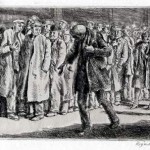 Paul Graham writes about ambition and cities. Paul seems quite concerned about ambition, status, but yet I really like this essay. It’s a nice variant on the well studied theme of specialization in cities. Regions specialize, for example Hartford in insurance and guns, and so it’s natural that each region’s alpha-males would be drawn into that specialization. Those who particularly aspire to ladder climbing will then strive that way.
Paul Graham writes about ambition and cities. Paul seems quite concerned about ambition, status, but yet I really like this essay. It’s a nice variant on the well studied theme of specialization in cities. Regions specialize, for example Hartford in insurance and guns, and so it’s natural that each region’s alpha-males would be drawn into that specialization. Those who particularly aspire to ladder climbing will then strive that way.
The other thing I like about Paul’s essay is how, no doubt, natives of each venue he passes over will be offended. He is, of course, making quick cartoon versions of each town and cartoons always offend somebody.
The New York City he describes is not the NYC of my youth. More than anything else the NYC of my youth was about diversity. So many many things packed together into one space. It was, it seemed to me then, impossible to climb to the top of that pile. There were so many distinct piles, all running off in different directions. I can certainly feel that same way about NYC these days, but yet his caricature of NYC as a place where the ambition is all about wealth rings true, about Manhattan. So much of Manhattan seems more like a odd walled community of the rich built out remnants of the more authentic city that was there before.
He allows that Silicon Valley is about power. Sure that’s true, but it would not be at the top of my list. At the top is a pervasive engagement with building things. Usually via entrepreneurial activity. While I have hung out in lots of places where people talk about it, the Valley is the only place were it was in the water. And there it was a form of play; like football or dancing. People who love to do create firms that do something new everywhere you turn. If that’s your kind of fun then that’s the place to live, just as if you love playing in a good intellectual thicket living in Cambridge you will find it easy to find other playmates. What he says about power, it’s true. It’s something that the guys that came and had a lot of fun building things come to learn, but they all seem sad about.
He seems to be describing smaller cities, like the one Hammett sited Red Harvest in, where the whole place’s workings could be revealed by throwing one or two well aimed spanners into the works. Cities over a certain scale ought to be able to be about many things, not one, and so they shouldn’t by default drag all their strivers into a single pattern. I don’t know, maybe globalization has made that something of a nostalgic fantasy.